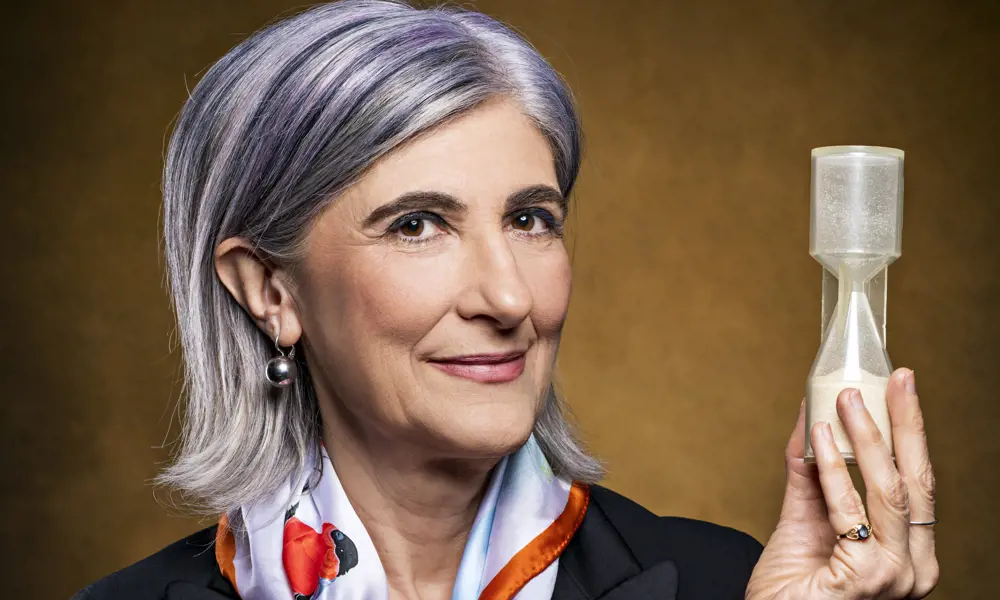
The ethics of engineering net zero
Few working engineers can say that their photograph greets passengers arriving at an international airport. But anyone travelling to COP26 in Glasgow may well have seen a picture of Raffaella Ocone OBE FREng FRSE at Edinburgh Airport without realising that they were looking at a picture of the first woman to become a professor of chemical engineering in Scotland and someone whose engineering research revolves around attempts to achieve net zero.
Professor Ocone, Chair of Chemical Engineering at Heriot-Watt University in Edinburgh, found time to take a photo alongside her portrait, which she shared on social media, on her first visit to Italy since COVID-19. She took the opportunity to fit in research meetings in Rome before visiting her mother, who still lives in the small Italian village where she grew up and where her father’s delight in fixing things was the spark that launched her career as an engineer. “Dad was not trained as an engineer, but he was very good at fixing things. Nothing was thrown away,” she says. She confesses that, like her father, she hangs on to things that might come in useful and has a garage full of spare parts that she may never be able to use.
She loved maths, chemistry and physics, and a desire to do something practical with science nudged her into engineering.
Her interest in ‘stuff’ guided Professor Ocone’s education choices. Italy’s schools are less restrictive than the UK’s, with no pressure to make early career choices. She loved maths, chemistry and physics, and a desire to do something practical with science nudged her into engineering. When choosing a university course, Professor Ocone didn’t know that there was such a thing as chemical engineering, but combining chemistry with maths sounded appealing.
Professor Ocone decided to study the subject and was keen enough on ‘chem. eng.’ to move into research and study for an MA and then a PhD at Princeton University, working with granular materials. This led to a research career centred on ‘modelling of complex reactive systems’ and a place as one of the ‘100 Most Influential Women in Engineering’ in 2019.
Becoming a global engineer
Princeton was the start of a career that took Professor Ocone to several countries before she arrived, almost against her will, in the UK. After Princeton she returned to Naples for her first steps up the academic ladder as a university lecturer, but she “didn’t like the environment”. It wasn’t just the problems that women sometimes face in engineering; she soon found that in Italy “the system did not reward merit”. The academic life was a far less happy experience than her time in the US. Her boss was Professor Gianni (Giovanni) Astarita, a noted expert in mass transfer with chemical reactions, the field that Ocone had started to research. Astarita had excellent contacts in the research world, so he tipped off Professor Ocone when a friend at UCL in London asked if he knew anyone who might be suitable for a university post at the University of Nottingham. Professor Ocone was working in France on sabbatical leave at the time. “He told me to go to the interview,” she says. But with the offer of a permanent job on the cards in France, she was already thinking of moving there.
If anything, she says, this plan removed some of the usual interview pressure. But as the interview with Nottingham progressed, Professor Ocone “thought that they were going to make me an offer.” The confirmation came as she walked into her hotel in London, preparing for a weekend with friends: the university offered her the job as a reader in the chemical engineering department.
She rang Astarita whose response was blunt: “take the job or I will never write you another reference”. She moved to Nottingham in 1995 and four years later, Heriot-Watt University lured her to Edinburgh to be the first woman to become professor of chemical engineering in Scotland. She was head of the Multiphase Multiscale Engineering Modelling research group and in June 2021 joined the Institute of Geoenergy Engineering to work towards energy transition.
Professor Ocone's journey into fluid research
Professor Ocone started her research career in the traditional way by following a path laid down by her professor. She then did something that she now encourages young researchers to do if you want to build your own reputation: “find an area that is not so linked to what your supervisor’s done”.
At first, her research concentrated on the flow of granular materials (solid particles). She then worked on combinations of particles and fluids, which took her into the world of fluidised beds – one of the fundamental tools of chemical engineering that feature in activities from coal combustion to the production of pharmaceuticals.
She then did something that she now encourages young researchers to do if you want to build your own reputation: “find an area that is not so linked to what your supervisor’s done”.
Professor Ocone’s research has delved ever deeper into measuring and modelling the flow of particles in industrial plant. A shorthand description of her expertise is “modelling complex reactive systems” or “multiphase flow of complex reactors systems”.
The oil industry uses fluidised beds in refineries for cracking heavy oil. In line with her ambition to fix things and do something useful, Professor Ocone believes that it is important for academic engineers to work with industry. For example, at the start of her career she worked with modelling processes in Exxon refineries in the USA.
Her research combines measurements on experimental rigs and industrial plant, with mathematical modelling. Working with real data is important and this has taken her more deeply into computational approaches. Professor Ocone’s latest moves have been to use artificial intelligence (AI) to tackle the floods of data that fluidised beds can create. As she sees it, AI involves data collecting, analysing and decision-making processes based on anything “artificial”, which can be a machine, an algorithm, or a computer program.
Professor Ocone’s interest in AI arose during her EPSRC Established Career Fellowship in Particle Technology. “It is a fellowship about really understanding some fundamental physical behaviour of granular materials.” It starts with particle-to-particle interactions. How does one particle interact with its immediate neighbour and then what happens when more and more particles enter the picture?
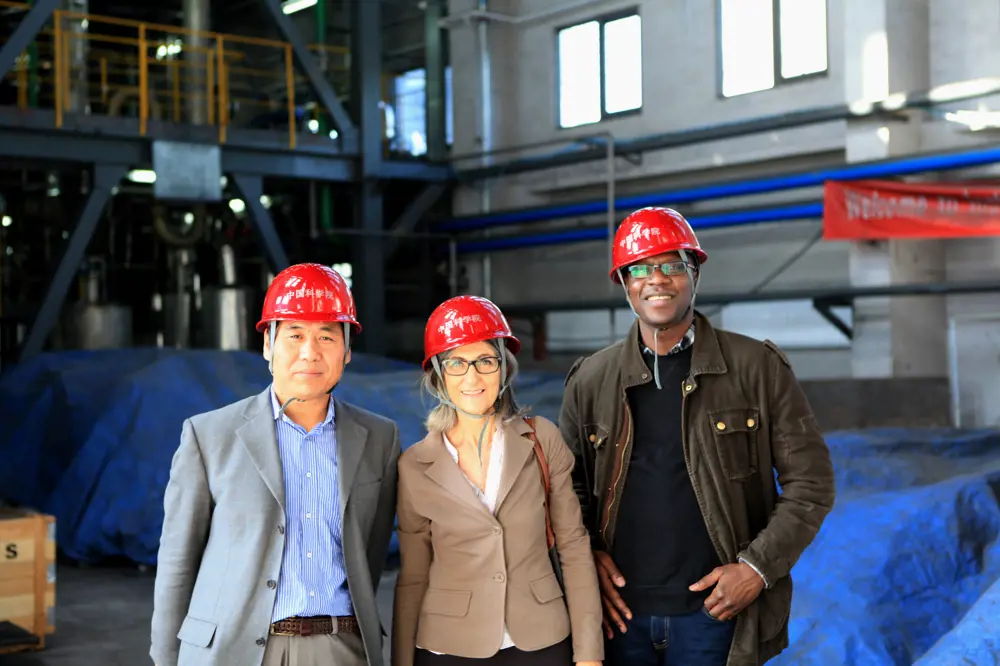
Before the pandemic, Professor Ocone travelled to China regularly to conduct research on projects on fluidised beds. The work combined Chinese expertise in using electrical capacitance tomography to measure what happens in fluidised beds with the Scottish team’s analytical skills. “We use the data to do the modelling and to see if we can predict the behaviour of these large reactors.”
For all the progress in understanding fluidised beds, some areas of operation still come down to state-of-the-art understanding. For example, fluidised beds have long had to contend with ‘clumping’ or, as the scientists put it, agglomeration. This is what happens when particles stick together and clog up the works. The fellowship is a six-year programme worth more than £1 million, working with partners that include the Chinese Academy of Science, the US Department of Energy and Syngenta.
As well as interrupting her fellowship, the pandemic has also halted Professor Ocone’s regular trips to China, where she has two projects. On top of the EPSRC fellowship, a Royal Society grant supports research with China on fluidised beds in coal combustion. Burning coal is controversial in an era of climate change, but China has already shown that it is not going to abandon it overnight. Although it does want to go about the process efficiently.
Professor Ocone is also working on how to produce hydrogen. Here she works within the university’s Institute of Geoenergy Engineering, which has experience in storage of CO2 and hydrogen, to tackle the process from production to storage. Geoengineering features in another application of the tools and techniques of flowing particles. Landslides might seem to be removed from fluidised beds, but here too particles are flowing in a fluid. Her group’s recent work on landslides shows how versatile the models can be. As Professor Ocone points out, with climate change landslides are becoming more a reality everywhere, so anything that adds to our understanding geophysical flows and the movement of soil particles is useful.
Fluidised beds
Fluidised beds are a key technology in coal-fired power stations and chemical processing. Professor Ocone’s research group deploys electrical capacitance tomography (ECT) to study what happens in a fluidised bed. ECT involves surrounding a non-conducting mixture of materials, such as a fluidised bed, with a ring of electrodes that measure the distribution of electrical capacitance. Sequential measurements from the array of sensors are a way of understanding the changing flow and distribution of materials.
Fluidised beds first made their mark in the petrochemical industry and coal combustion, but the underlying science and technology are versatile. Her EPSRC fellowship, for example, cites food processing and pharmaceuticals as industries that can benefit from the research. Ocone has used her expertise to address various challenges that promise to have more climate friendly applications. “Gradually I moved towards applications in pyrolysis of biomass and hydrogen production, to see if there are ways to produce hydrogen that are greener than what we do at the moment.” She has also turned her work on mathematical modelling to investigate recycling of plastics.
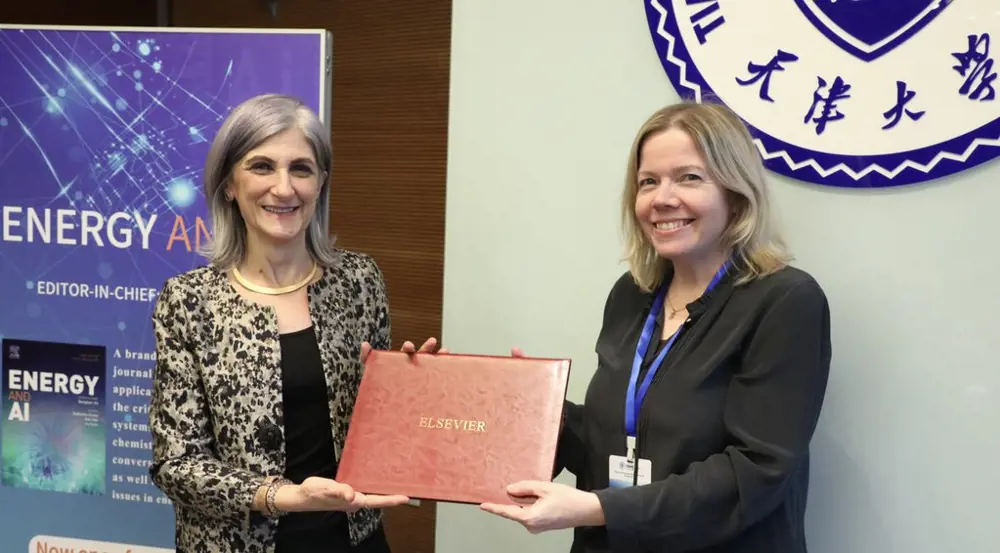
Professor Ocone is on the editorial board of a new research journal, Energy and AI, which aims to provide an authoritative academic exchange and publishing platform to disseminate and promote the latest progress in the application of artificial intelligence in the field of energy.
Data bases, computer modelling and industry
Computer modelling has become increasingly important during Professor Ocone’s research career. “In multiphase flow, we use computational fluid dynamics much more than we used to when I started.” She recalls that when she first began her research, in a subject that relies on complicated mathematics, she would write her own computer code.
It was when working in refineries that Professor Ocone saw how much data large chemical plants can generate. Chemical engineering is now awash with data from many industrial systems and processes. The challenge can be to gain the trust of industry to let you plunder the data mountains. “It is not always easy to get data from industry, but the amount of data they have is amazing.”
But the development of techniques like computational fluid dynamics (CFD) have done wonders for efficiency. “Many things have been understood through a very clever marriage between experiments and CFD.” But you have always to validate what you do. That is why it is important to work with industry and to confirm the models. “We want to make sure that our models can be used, can be inserted in these big commercial CFD codes.”
The challenge has become one of finding useful information. This led Professor Ocone to think that AI could help researchers make some sense out of this data. “I got interested in AI during my fellowship,” she says. “You need data to do it.” AI concerns feeding data into ‘code’ that can give you answers.
One sign of the rising power of AI is in a new research journal that Professor Ocone is involved in, Energy and AI, that hopes to provide a bridge between the two disciplines. She has also used her position as an editor to comment on the rising importance of another discipline that has consumed a lot of her recent time: ethics. Prompted by the outbreak of COVID-19, she has added her long running interest in ethics to AI and her chemical engineering.
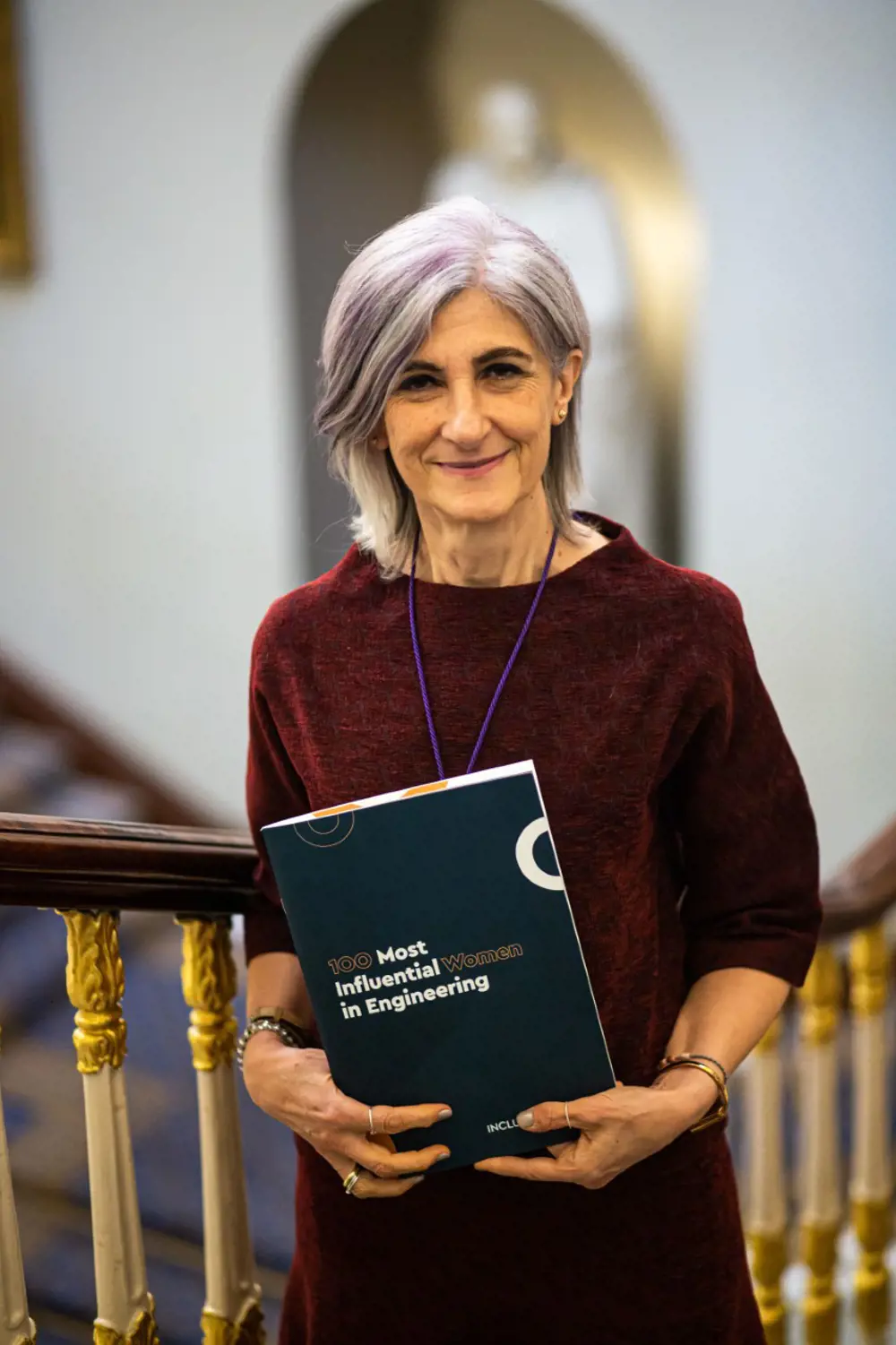
In 2019, Professor Ocone was named one of the Top 100 Most Influential Woman in Engineering by Inclusive Boards and the Financial Times.
Ethical dilemmas in engineering practice
Ethics came into Professor Ocone’s life when her position on the Engineering Professors’ Council came together with her work with the Royal Academy of Engineering. As she points out, ethical dilemmas have long been a part of engineering practice. Engineers have a code of practice, but ethics weren’t a part of the academic engineering curriculum. “Very few departments used to teach ethics in engineering,” she says. This changed when the Engineering Professors’ Council and Academy set up a working group on teaching ethics in engineering; Professor Ocone stepped in on the basis that, if no one else wanted to take it on, she would.
Not that she found working on ethics a walk in the park. “I came from engineering where I was dealing more with numbers. Dealing with something like ethics was very very difficult. It is an opinion in some cases. It is a dilemma. It is what you think is right. But you might be wrong.”
She traces her interest in issues beyond engineering back to her Italian education, where high school students don’t have to choose an increasingly narrow set of subjects. She studied geography, Latin and history for eight years, and philosophy for more than five years so thinking about ethics wasn’t as intimidating, or novel, as it might have been for someone with a narrower education. As she says: “I never thought that an engineer should be just a technical person.”
Another lesson from Italy was the student’s approach to political thinking. In Italy, she explains, high school was very political. “We used to strike for everything. ‘The heating is not very good today, strike. The water is not very hot today, strike.’ When I arrived in 1995, if I asked students in England about politics, they would be puzzled.” As she recounts it, their line was: ‘We are engineers, give us the engineering problems’. “The students knew how to design a plant, how to choose the pump on a plant, better than I did. I knew lots of science, engineering science, but much less practical engineering.”
Undergraduates have changed since the 1990s. Today’s students are extremely aware of social issues, she reports. “They question the academics with ethical issues.”
Undergraduates have changed since the 1990s. Today’s students are extremely aware of social issues, she reports. “They question the academics with ethical issues.” Universities now also teach engineering degrees with courses on ethics. And there are clear signs that students are increasingly interested in thinking about ethics.
Professor Ocone illustrates the rise in student interest with numbers taken from her own teaching. For a while now, engineering undergraduates at Heriot-Watt could choose a final-year project on ethics. Until recently, the option had no takers. Suddenly this has changed, driven partly by the pandemic. “In the last two or three years, that is one of the projects that students have most interest in.”
It helps that degree courses have clear ways of putting ethical issues before students. For example, case studies are a tried and tested way of exposing students to ethical dilemmas. Here Professor Ocone played a key role in her work with the Engineering Professors’ Council and the Academy. She is part of the group that wrote the case studies that support many engineering degree courses.
Career timeline and distinctions
Research student at the University of Naples, Italy, 1985–1987. PhD student, Princeton University, US, 1987–1991. Visiting professor, Louisiana State University, USA, 1992–1993. Lecturer in chemical engineering, University of Naples, Italy, 1992–1995. Visiting professor, LAGEP, Université Claude Bernard, France, 1995. Reader in chemical engineering, University of Nottingham, 1995–1999. Professor of chemical engineering, Heriot-Watt University, 1995 to present. Cavaliere (Cav-Knighthood) of the Order of Merit, Italian Republic, 2006. Fellow, Royal Society of Edinburgh, 2006. Fellow, Royal Academy of Engineering, 2013. Caroline Herschel Visiting Professorship, RUhR Universität, Bochum, Germany, 2017. Awarded OBE for services to engineering, 2019. Fellow, American Institute of Chemical Engineers, 2021. Guest professor of multiphase multiscale systems, RUhR Universität, Bochum, Germany, 2021–2024.
Professor Ocone cites the Challenger disaster as a classic engineering case study for students. The rocket exploded on launch when a seal failed because the material was colder than the design conditions. It is a straightforward technical issue that demonstrates that you cannot extrapolate how a material will behave in different conditions.
However, much as disasters can expose students to ethical issues, Professor Ocone advocates a move away from this emphasis. “This is the way we used to teach it – analyse this disaster based on ethical considerations.” Today she advocates a broader approach, and one that prompts engineers to think about the ethical implications of their work when it turns out as expected, without any disasters. “Today we have to be a little bit more careful because we can develop technologies that can have unwanted effects that we cannot predict when we are developing our technologies.”
She admits that it isn’t easy to anticipate the use and misuse of emerging technologies. It boils down to her view that engineers cannot think about, or teach, ethics as a separate thing. “It should be embedded in the way that we teach engineering. It is important that students relate ethics to their engineering job.”
For Professor Ocone, ethical thinking is at the heart of what engineers do. “Ethics should not be simply ‘bolted onto’ engineering and technological activities, but rather it should be systemic.” She takes this even further. “The engineer has to find ‘solutions’ to ethical problems.” She sees similarities between engineering and medical ethics.
Ideas on how to approach ethics in engineering education have changed in the decade or so since engineering degrees first covered the subject. Professor Ocone is currently chairing an Engineering Professors’ Council and Academy working group producing 20 new ethics case studies. She is particularly keen for her students to tackle a new one on the ethical issues of “the energy transition”. This is an area where she has considered some of the ethical questions we face as the world seeks to achieve net zero. It is important, she believes, to analyse the ethics of the engineering options on the table: “we need to weigh them in the balance or we could end up with as bad a mess as the technologies we want to eliminate.”
“We have demonstrated that under pressure we can deliver in a very short time,” says Professor Ocone. Climate change is certainly one engineering challenge that needs concerted efforts.
This is the sort of ethical dilemma that engineering students could address. For example, Professor Ocone wrote recently about the idea that we could achieve ‘negative emissions’ of CO2 by adding carbon capture to electricity generation from burning wood. “The logic of the negative emissions argument is that burning wood is ‘carbon neutral’ because trees absorb CO2 from the atmosphere in the first place, and you are simply releasing it back.” The trouble with this idea, she adds is that it considers the process of burning wood in isolation. “It ignores, just as an example, a wider chain of activities including planting and harvesting the trees, converting the wood into chips and then shipping them to the power plant – not to mention storing and using the captured CO2 once the wood has been burned.” But that is just a part of the problem with this proposed engineering solution. “Too many people also tend to see wood as better than oil or coal because the amount of CO2 produced by burning a given unit is much lower for wood. This overlooks the fact that you get considerably more heat from burning a unit of oil or coal than from wood. In other words, you have to burn much more wood to produce the same amount of heat, so the pollutant emissions might be more than they appear.”
In the wake of COP26,such questions are high on the engineering agenda. For lessons on how to approach climate change, Professor Ocone takes heart from how engineers responded to the pandemic. As chair of the Academy’s Awards Committee, she took part in the deliberations surrounding President’s Special Awards for exceptional achievements in tackling COVID-19. For example, engineers and researchers showed what is possible in their response to the need for ventilators and in the rapid development of vaccines. “We have demonstrated that under pressure we can deliver in a very short time,” says Professor Ocone. Climate change is certainly one engineering challenge that needs concerted efforts.
Keep up-to-date with Ingenia for free
SubscribeRelated content
Chemical

Q&A: Olivia Sweeney
Olivia Sweeney sources aroma chemicals to create fragrances at cosmetics company Lush. She is working on finding new, more sustainable sources of fragrance ingredients, with an interest in the research and development of chemical production from waste streams.
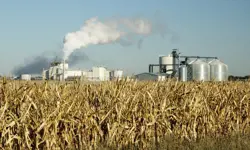
Biofuels’ journey to the mainstream
Liquid biofuels today make up about 8% of road and non-road fuel supplies in the UK. The government plans to reach nearly 10% by 2020 in order to reduce CO₂ emissions. It has also laid out targets to incentivise innovation and the production of ‘development fuels’.

Compostable plastics
Compostable plastics can be turned – alongside food and other organic waste – into compost. But how environmentally friendly are they really?
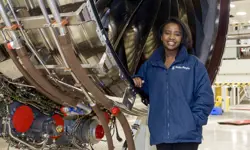
Q&A: Michelle Watiki
From placements at Xerox and Rolls Royce, to becoming a board member for the Association for Black and Ethnic Minority Engineers, chemical engineering graduate Michelle Watiki hopes to apply her knowledge to sustainability and net zero, as well as helping future engineering students.
Other content from Ingenia
Quick read

- Environment & sustainability
- Opinion
A young engineer’s perspective on the good, the bad and the ugly of COP27

- Environment & sustainability
- Issue 95
How do we pay for net zero technologies?
Quick read

- Transport
- Mechanical
- How I got here
Electrifying trains and STEMAZING outreach

- Civil & structural
- Environment & sustainability
- Issue 95